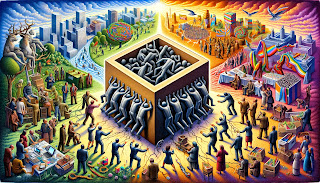Creativity and Governance
One of the great problems of a two party system, and of ideological rigidness that unquestioning loyalty to a particular ideology creates is the deprivation of creative and innovative thought and policymaking within the political system.
This happens because ideological loyalty confines political innovation to a set of parameters dictated by that particular ideology. In other words, the viewpoints and tenets of certain political groups don't allow ideas that deviate from their established way of thinking.
This almost always chokes innovation in policymaking that could make amazing and powerful positive changes within the system. Ideological rigidness confines policymaking to a set of established ideas and agendas that are not flexible. This ideological rigidness is, unfortunately, a biproduct of a dichotomous two party system.
Along with the name-calling and fear-mongering that comes naturally within American politics, ideological rigidness and inflexibility in policymaking and innovation cripples our ability to be creative. Our minds are confined and constricted by rigid ideological mental constructs, funneling our thinking into patterns and ideation governed by the laws, dynamics, and agenda/objectives of our ideologies and belief systems. We think in terms of loaded phrases and hot-button talking points and ideas, restricting our thought patterns to the predominant social and cultural political fads and the predominant zeitgeist of the current collective minds of the nation.
"Thinking outside the box" is inherently challenging when your thought processes are governed and dominated by rigid political ideologies. This will continue to inhibit creativity and innovation within lawmaking and policymaking.
Yes, creative ideas can be threatening. Creative ideas and innovative policies can be frightening and even dangerous, but they are absolutely necessary for the progress and advancement of a society and absolutely necessary for combatting social ills like poverty, war, corruption, and hate.
Unfortunately, the predominant political culture is combative and filled with hateful rhetoric and vitriol. We label each other with names and labels that are inflammatory and demonizing. We call each other names, and demonize each other and the ideas that we have and not actually take the time to think about what we are saying and what we believe. We divide ourselves and undercut our ability to unify around common threats and common challenges. We slander our neighbors. We label and curse our peers and our leaders.
Respect is a dying art, and we see politics as more of a sport than a public service. Unfortunately wedging and dividing each other along rigid party and ideological lines not only leads to conflict and open hostility between the two sides. It absolutely cripples political creativity and innovation. Such innovation that is absolutely necessary in combatting our social and political ills and even threats to our national security.
One thing many teachers tried to teach me and my peers was the concept of "thinking outside of the box." Well, that's one of the reasons I write these posts. I think of the political spectrum as a dichotomous "box" and the ideologies that govern it and lie on that spectrum as mentally and cognitively confining information that restricts and inhibits someone's ability to be creative and innovative politically and socioeconomically. Economic creativity is a whole 'nother ballpark that I will have to touch on at a later time and a later post.
"Thinking outside the box" is challenging for many people. It's especially challenging for combative and competitive humans who view the world in terms of "us-or-them" and are confined by the rigid ideas of their ideologies and the "labeling" system of assigning categories and labels to opponents designed to demonize and delegitimize them. I look at demonization and labeling as extremely counterproductive and even destructive. Such patterns of thinking and strategies are primitive at best and definitely don't lead to creativity.
Competition can lead to creativity and innovation technologically and economically. I am pretty sure of that. However, combativeness in politics is not a creative approach and the rigidness of the ideologies set the paradigm and dictate how you can think, what you can think, and how you can apply your ideas. This stifles creativity and innovation by default because it "boxes" thinking and ideation in. It's hard to "think outside the box" when you are boxed in like that.
To some up this post, I believe the most effective government, and the most successful society, is the creative one. Creativity and innovation are essential to the long term survival of a nation and the long term stability of a government. Thinking outside the box and outside the rigid confines of an ideology are some of the most effective ways of enhancing and fostering creativity within a political system.
Good morning.




Comments
Post a Comment